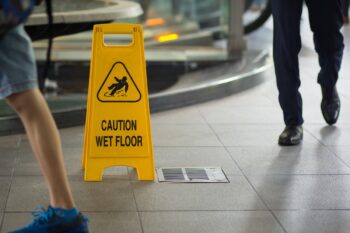
Talk to a lawyer if you were in a slip-and-fall accident in Jacksonville. Owners of property in Florida are required to maintain safe conditions for visitors to their premises, whether this is a private property, a government building, or a public area. However, there are unfortunate situations where people are injured due to things like improperly maintained stairways, slippery floors, exposed electrical wires, and more.
If you have been hurt after slipping on a wet floor or slick surface on someone else’s property, contact a Jacksonville personal injury attorney as soon as possible for a free initial consultation about your situation.
No two accidents are alike, so no matter how much information we provide below, you will have many questions about your unique case and how we can help you get the money you rightfully deserve. Take a look below to get a general sense of how a slip-and-fall case works, and contact us today to schedule your consultation.
What Is a Slip and Fall Premises Liability?
Simply put, any premises liability case stems from a property owner’s (or, in certain instances, a lease or management company’s) failure to maintain their property to keep it safe for visitors. In the specific instance of a slip and fall, the victim slips and falls due to a slippery floor from a spill, a cleaning person failing to leave out a warning sign at the door of a bathroom, or, in colder climates, an icy walkway. Many specific scenarios can lead to a slip and fall, but this is the general idea.
When we see a bright yellow sign in the aisle of a grocery store or at the front of a public bathroom warning us of a “Wet Floor,” it is more than a courtesy: it is to avoid liability in the event that someone slips on the floor, as the owner will be able to argue that they were adequately warned of the danger. If, on the other hand, you were to slip on a floor due to a leak or a spill and the owner did not either fix the leak or put a sign, then a Jacksonville premises liability lawyer can help you pursue damages.


Start Your Free Case Evaluation
How Much Is a Slip and Fall Case Worth?
As with any personal injury case, the money owed to a victim is entirely specific to the situation. Personal injury cases seek compensation for a variety of damages, many of which an insurance company will not include in their own investigation or factor into their settlement offer.
The following is a general breakdown of the two types of compensatory damages present in personal injury cases.
Economic Damages
Economic damages are those damages that have actual values associated with them — essentially, anything that comes with a bill, receipt, invoice, or financial statement. They include all of your medical bills and related costs, such as copayments, prescriptions, assistive devices, physical therapy, and any type of treatment for catastrophic injuries.
In addition, economic damages seek compensation for any impacts to your income or earning capacity, such as lost wages from missed time at work, vacation days, or sick leave used to cover these days off, as well as reductions to your actual earning capacity.
There are many other economic damages, as well, each of which your attorney will help you understand as they compile and calculate them. One of the most significant benefits of working with a personal injury attorney in Jacksonville is that you have access to an experienced legal professional who knows where to look to find every possible damage to include in your negotiations with the insurance company, many of which would otherwise be overlooked.
Non-Economic Damages
Non-economic damages are more complicated to calculate because they seek monetary compensation for damages that do not have set, measurable dollar values associated with them. For example, one of the most common non-economic damages is “pain and suffering,” a very real impact of an accident that has no market value.
Your premises liability attorney will gather all of the non-economic damages that you have endured, including things like fear, anxiety, or post-traumatic stress disorder (PTSD) following your accident, and will use one of a number of tools available to put a dollar value on them.
Insurance companies prefer to avoid paying as much non-economic damages as possible, so these will likely be what most of the negotiations are focused on. Trying to negotiate non-economic damages on your own — especially while you are recovering from serious injuries — can be overwhelming, so leaving this to an experienced slip-and-fall lawyer is your best bet.


Start Your Free Case Evaluation
Frequently Asked Questions to Our Jacksonville Slip and Fall Accident Lawyer
Navigating the aftermath of a slip-and-fall accident can be overwhelming, and understanding your rights is crucial. Our Jacksonville slip and fall accident lawyer is here to provide answers to some frequently asked questions to guide you through this challenging time.
What Qualifies as a Dangerous Condition in a Slip and Fall Case?
A dangerous condition refers to any situation or element on a property that poses a risk to visitors. That could include wet floors, uneven surfaces, inadequate lighting, or any other hazard that the property owner should have addressed to maintain a safe environment.
How Important Is Evidence in a Slip-and-Fall Claim?
Evidence plays a pivotal role in establishing liability in a slip-and-fall case. Documentation such as photos of the accident scene, witness statements, and medical records can significantly strengthen your claim and help demonstrate the dangerous condition that led to your injuries.
What Steps Should I Take to File a Personal Injury Claim After a Slip and Fall Accident?
Initiating a personal injury claim involves several key steps, including gathering evidence, determining the liable party, and adhering to the statute of limitations. Our experienced attorney can guide you through this process and ensure you meet all requirements.
How Is the Liable Party Determined in a Slip-and-Fall Case?
The liable party is typically the property owner, renter, or management company responsible for maintaining the premises. Establishing liability involves demonstrating that their negligence or failure to uphold the duty of care led to the dangerous condition causing your slip and fall.
Can Emotional Distress Be Included in a Slip-and-Fall Claim?
Yes, emotional distress resulting from a slip and fall accident can be included in your claim. That may encompass feelings of fear, anxiety, or depression caused by the incident. Our attorney will work to quantify these non-economic damages for fair compensation.
What Is the Duty of Care in a Slip-and-Fall Case?
Property owners owe a duty of care to visitors, requiring them to maintain a safe environment. If they breach this duty by neglecting hazards, they may be held responsible for injuries sustained on their property.
Are There Time Limits for Filing a Slip and Fall Claim in Jacksonville?
Yes, Florida has a statute of limitations that restricts the time within which you can file a personal injury claim to two (2) years. It’s crucial to consult with our attorney promptly to ensure your case adheres to these legal timelines.
How Can a Jacksonville Slip-and-Fall Accident Lawyer Help With Head Injuries or Traumatic Brain Injuries?
Our Jacksonville attorneys, with experience in traumatic brain injuries and head injuries, will work to assess the full extent of your damages. We include medical expenses, lost wages, and the long-term impact on your life to pursue fair compensation.
What Types of Compensation Can I Seek in a Slip-and-Fall Case?
Victims of slip and fall accidents may seek various forms of compensation, including economic damages for medical expenses and lost income, as well as non-economic damages for pain.


Start Your Free Case Evaluation
Talk to an Experienced Jacksonville Slip and Fall Accident Attorney Today
Slip and fall accidents may not seem like a big problem, but the truth is such an accident can leave an entire family in debt and cause pain and suffering to the victims. However, a specialized attorney can look into your case and help you pursue compensation for all your damages.
If you were the victim of someone else’s negligence in a slip-and-fall accident, you may need to talk to an experienced lawyer. Fasig | Brooks Attorneys can offer a strategic consultation at no cost and work on your case on a contingency basis. That means if we don’t win, you don’t pay. Contact us today.


Start Your Free Case Evaluation

